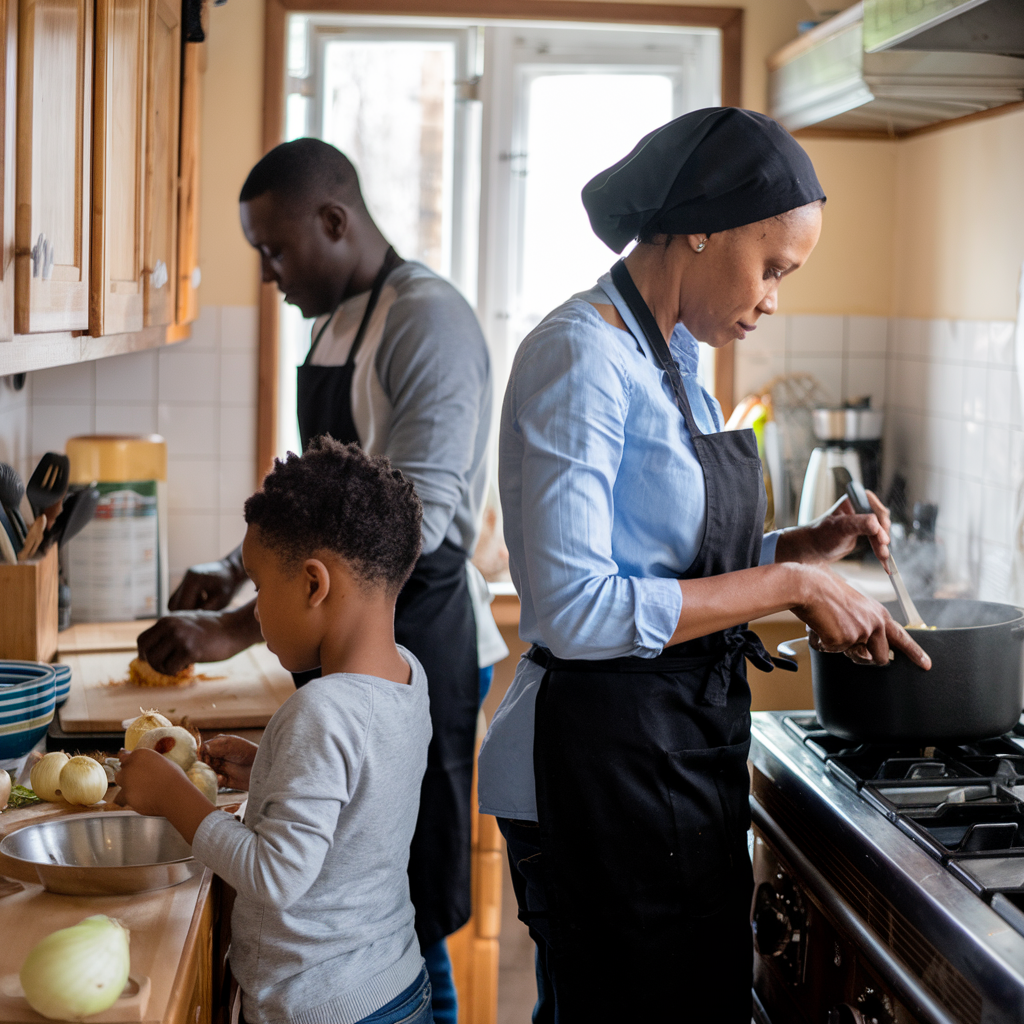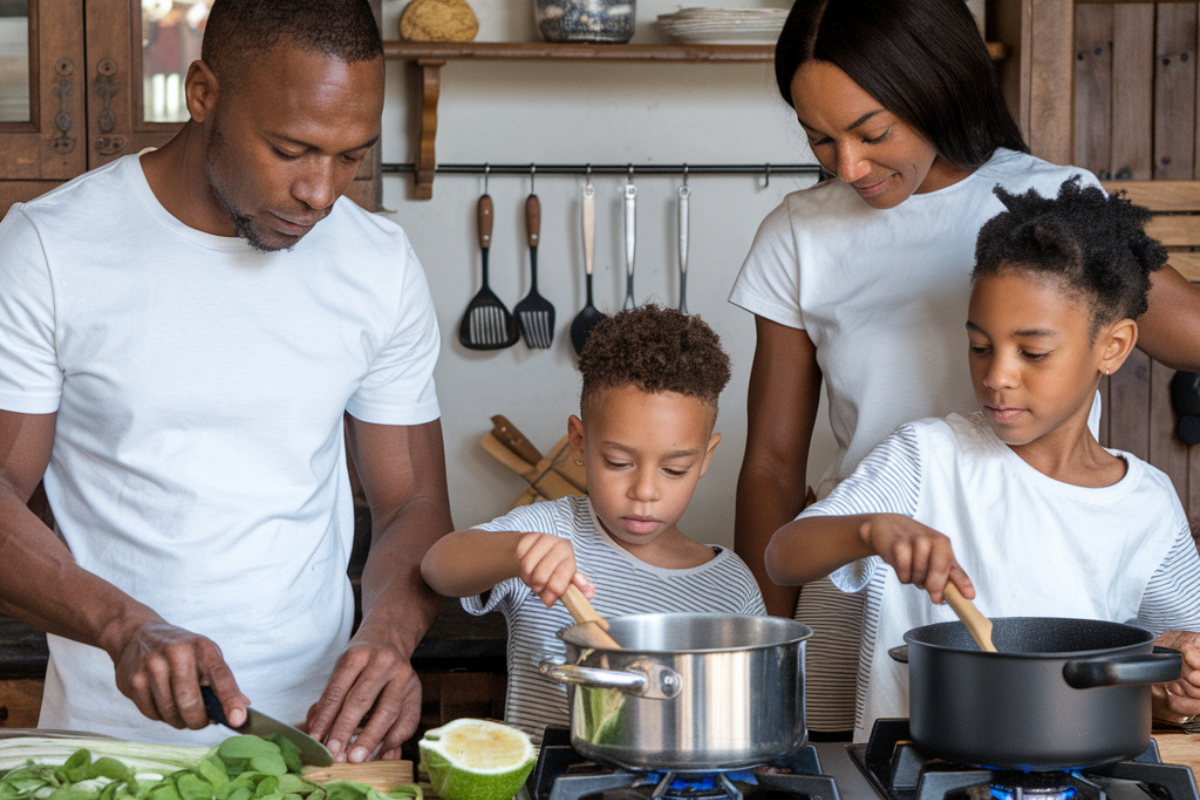Cooking with children is more than just preparing meals. It’s an opportunity to bond, learn, and create lasting memories. It is also one of the best ways to engage them in a meaningful activity. Whether it’s a simple breakfast or a big dinner, involving children in the kitchen fosters valuable life skills and strengthens family bonds and connections.
From teaching responsibility to promoting creativity, cooking with children has numerous benefits that goes beyond just making food.
This article will explore the top 10 benefits of cooking with children and how it can positively impact their development and family life.
1. Creates Lasting Memories
Think about growing up as a child. Do you have fond memories of helping your parents in the kitchen, cooking with them, and learning a special family recipe? I remember the fun and memories of helping my mum in the kitchen with peeling seasoning cubes, washing dry fish, and grinding pepper and crayfish. Those were memorable for me.
Cooking with your children creates those special moments they’ll cherish for years. It provides an opportunity to spend uninterrupted time together without distractions from screens or outside commitments. It is also an opportunity to pass down some family cooking traditions. Many family recipes hold sentimental value, and teaching them those traditional dishes keeps cultural and family traditions alive.
The kitchen is also perfect for sharing stories, reminiscing about past experiences, and building stronger relationships.
When you invite your child into the kitchen, you are doing more than just making a meal. You’re creating priceless memories that will last a lifetime.
2. Teaches Kitchen Safety
The kitchen can be dangerous if one doesn’t know the risks. By cooking together, you can teach your children essential safety practices from a young age.
They will learn kitchen skills like;
- Knife Safety: Showing them how to hold and use a knife properly. Teach age-appropriate knife skills like cutting soft foods with a butter knife before moving to sharper ones.
- Fire and Heat Awareness: Explain the dangers of hot surfaces, flames, and boiling water or oil, ensuring they understand how to stay safe.
- Cleanliness & Food Safety: Teach them to wash their hands, avoid cross-contamination, and store food correctly to prevent illness.
By supervising your children in the kitchen, you’re helping them develop confidence while ensuring they learn vital safety measures.
3. Encouraging Creativity
Cooking is a fantastic way to unleash creativity in children. From experimenting with new ingredients to decorating baked foods, children can explore endless possibilities in the kitchen.
They can explore Flavors & Textures by allowing them to mix and match ingredients, discovering what works and what doesn’t.
They will learn Creative Plating by encouraging them to present their meals in fun ways, such as making smiley faces with their rice or making colourful salads.
You can also spark their creativity by asking them to Invent New Recipes: Let them come up with their own meal ideas, it might lead to exciting new family favorites.
Who knows? Your child could develop a passion for cooking from such and can go ahead to have a food channel.
4. Encourages Healthy Eating Habits
If you struggle with a picky-eating child, cooking together might be the solution.
Children are more likely to eat meals they’ve helped prepare. When children touch, smell, and prepare food, they become more comfortable with different textures and flavours, and If they’ve contributed to making a dish, they’ll feel proud and excited to taste it.
Cooking together also allows you to introduce unfamiliar foods in a fun and engaging way to your children.
Next time your child refuses to eat a particular food, try letting them prepare it themselves. You might be surprised at the results.
5. Strengthening Family Bonds
Cooking with your children is not just about the food. It’s about togetherness.
Spending time in the kitchen together strengthens relationships and creates a warm, connected family atmosphere.
It will help with the following;
- Teamwork & Communication: Everyone has a role, from stirring ingredients to setting the table.
- Laughter & Fun: Expect a few spills and mistakes but also lots of giggles and shared joy.
- Disconnecting from Screens: Cooking is a great way to step away from technology and focus on family time.

6. Enhances Academic Skills
Cooking is a hands-on learning opportunity that teaches children valuable academic and life skills. For example, cooking helps with the following;
- Math Skills: Measuring ingredients helps understand fractions, counting, and basic arithmetic.
- Science Concepts: Watching our heat change food during cooking (like dough rising or eggs solidifying) introduces basic chemistry.
- Reading & Comprehension: Following a recipe enhances reading skills and improves the ability to understand instructions.
Cooking transforms learning into a fun and delicious experience!
7. Improves Focus and Following Directions
One of the most practical benefits of cooking with children is improving their ability to follow instructions.
Cooking requires attention to detail with step-by-step thinking, listening and following recipe instructions correctly, thus enhancing your children’s ability to concentrate and follow instructions.
Cooking also helps Children Understand Consequences because If they skip a step or mismeasure an ingredient, they will quickly see the impact on the final result. This lesson in discipline and attention to detail will serve them well in school and beyond.
8. Develop a Sense of Responsibility
Giving children responsibilities in the kitchen teaches them accountability and the importance of contributing to household tasks. They will also learn life skills like;
- Ability to Complete Tasks: Assigning age-appropriate jobs while cooking helps them feel capable and independent.
- Cleaning Up: Learning to clean as they go instils good habits and responsibility.
- Taking Ownership: When kids take part in making a meal, they take pride in their work.
Responsibility in the kitchen translates to responsibility in other areas of life.
9. Makes Learning Fun
The kitchen can be a playground where learning and fun go hand in hand.
Cooking is an enjoyable way for children to learn without even realizing it. From reading a recipe to understanding measurements, cooking turns education into an engaging and rewarding hands-on experience.
10. Boost Self-Confidence
One of the most rewarding aspects of cooking with children is watching their confidence grow. There’s nothing quite like the sense of accomplishment that comes from preparing a meal. When children successfully cook something delicious, it builds their self-esteem and confidence. They feel proud knowing they contributed to the family meal. Knowing they can prepare food for themselves empowers them and promotes independence.
Cooking is a life skill that builds competence and confidence in children, preparing them for adulthood.
Conclusion
Cooking with children is more than just a fun activity. It is an investment in their future. From teaching responsibility and safety to fostering creativity and confidence, the kitchen offers countless opportunities for growth.
So, grab your apron, invite your child to help, and start making delicious meals and lifelong memories together.
Thank you, and God Bless!
Peace!
FAQs
- At what age can children start helping in the kitchen?
- Even toddlers can help with simple tasks like washing vegetables or stirring ingredients. See YouTube shows like Chop Junior.
- How can I make cooking safe for young children?
- Use age-appropriate tools, supervise them closely, and teach proper kitchen safety rules.
- What are some easy recipes for children?
- Let them start by fixing a bowl of cereal. Also, try making homemade pizzas, fruit salads, scrambled eggs, or simple noodles.
- Can cooking help with picky eating?
- Yes! Children are more likely to eat food they’ve helped prepare.
- Why is cooking an important life skill?
- It teaches independence, responsibility, and essential survival skills for adulthood.
Happy cooking!
Please do not forget to leave a review once you start cooking with your children. Tell us what your first experience is like.






